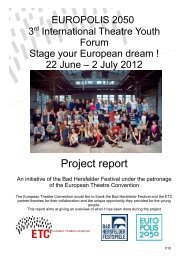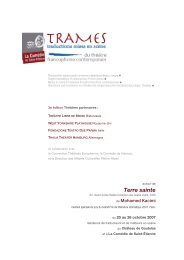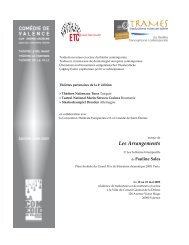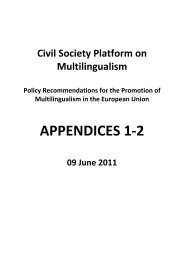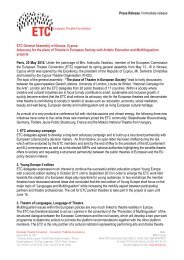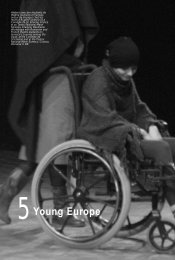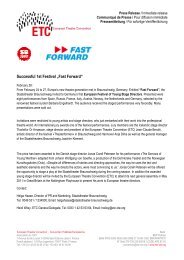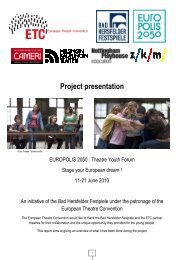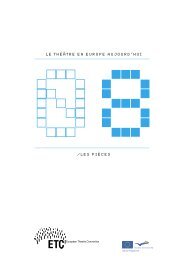Le théâtre en Europe aujourd'hui - European Theatre Convention
Le théâtre en Europe aujourd'hui - European Theatre Convention
Le théâtre en Europe aujourd'hui - European Theatre Convention
Create successful ePaper yourself
Turn your PDF publications into a flip-book with our unique Google optimized e-Paper software.
moldova<br />
moldavie<br />
+ info<br />
> www.etc-cte.org<br />
108<br />
ADDRESS/ADRESSE<br />
E: esin<strong>en</strong>cu@yahoo.com<br />
WORKS/ŒUVRES<br />
A Saptea Kafana (co-author)<br />
PREMIERE/CRÉATION<br />
Eugène Ionesco <strong>Theatre</strong>, Chisinau<br />
09.04.05<br />
><br />
DIRECTOR/METTEUR EN SCÈNE<br />
Valeriu Pahomi<br />
TRANSLATIONS/TRADUCTIONS<br />
Forthcoming/prochainem<strong>en</strong>t:<br />
Fr<strong>en</strong>ch/Français<br />
CHARACTERS/PERSONNAGES<br />
1 female/femme<br />
Nicolette Esin<strong>en</strong>cu 1978<br />
fuck you, eu.ro.pa!<br />
Fuck You, Eu.ro.pa! is a monologue for a young woman, writt<strong>en</strong> in<br />
a fast, punchy and oft<strong>en</strong> aggressive style. Behind the provocative<br />
cry of the title lies a deep-running feeling of revolt and bitterness.<br />
Despite its obvious autobiographical quality, the play refers to<br />
the common experi<strong>en</strong>ce of a whole g<strong>en</strong>eration. The journey of the<br />
c<strong>en</strong>tral character reflects the destiny and the dashed hopes of the<br />
g<strong>en</strong>eration to which Nicoleta Esin<strong>en</strong>cu (born in 1978) belongs.<br />
The writing is heavily informed by the political history of Moldova,<br />
a small Romanian-speaking state, that became indep<strong>en</strong>d<strong>en</strong>t after<br />
the dismembering of the Soviet Union. The play paints the picture<br />
of a young g<strong>en</strong>eration that is standing on a tightrope betwe<strong>en</strong> two<br />
worlds. A postcommunist society, squashed by poverty, where the<br />
traces and memories of the old regime still hav<strong>en</strong>’t vanished and<br />
where the promises of material comfort are yet to be realised. The<br />
protagonist, a young girl, addresses her father in a dark, funny and<br />
unforgiving wink to the author’s own family. Disillusion has come<br />
too fast for this new g<strong>en</strong>eration that couldn’t wait to cross the<br />
borders, hungry to discover the forbidd<strong>en</strong> consumer society they had<br />
dreamed of. The play goes beyond the simple provocation of the title,<br />
to show us real suffering, sincerely and truthfully.<br />
La pièce, d’une vingtaine de pages, est un monologue pour une<br />
jeune femme, dans un style nerveux, rythmé, aux phrases courtes,<br />
souv<strong>en</strong>t agressives. Comme le titre l’indique, il s’agit d’abord d’un<br />
cri, mais qui, derrière le geste provocateur, laisse deviner les raisons<br />
profondes d’une révolte et d’une amertume ancrées et légitimes.<br />
<strong>Le</strong> texte semble autobiographique, même s’il s’agit surtout du<br />
vécu collectif de toute une génération, <strong>en</strong> tout cas la trajectoire<br />
du personnage se superpose sur la destinée et les espoirs déçus<br />
de la jeunesse actuelle, à laquelle Nicoleta Esin<strong>en</strong>cu (née <strong>en</strong><br />
1978) apparti<strong>en</strong>t. Car, on ne peut faire abstraction ni des données<br />
historiques ou politiques du « terreau » qui fit naître cette écriture<br />
– la Moldavie, petit état de langue roumaine, dev<strong>en</strong>u indép<strong>en</strong>dant<br />
après le démembrem<strong>en</strong>t de l’ex-Union soviétique – ni des destinées<br />
chavirées de cette jeunesse <strong>en</strong> fragile équilibre <strong>en</strong>tre deux mondes.<br />
Une société post-communiste, écrasée par la misère, où les traces<br />
et les souv<strong>en</strong>irs de l’anci<strong>en</strong> régime n’ont pas <strong>en</strong>core disparu et où<br />
les promesses d’un bi<strong>en</strong> être matériel à v<strong>en</strong>ir se laiss<strong>en</strong>t <strong>en</strong>core<br />
att<strong>en</strong>dre. <strong>Le</strong> personnage, une jeune fille, s’adresse à son père. Il<br />
s’agit surtout d’un bilan de sa propre famille – réduit à quelques<br />
traits d’un humour noir et sans ménagem<strong>en</strong>ts. La désillusion est<br />
arrivée trop vite pour cette nouvelle génération qui s’est précipitée<br />
<strong>en</strong> dehors des frontières, avide de découvrir l’interdit, la société de<br />
consommation tant rêvée. Au-delà de la simple provocation du titre,<br />
la souffrance est là et le ton est auth<strong>en</strong>tique.



